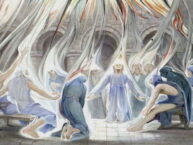
Image from the video of the shooting as posted on a public twitter account.
May 10, 2020: May God’s words be spoken, may God’s words be heard. Amen.
If you joined our service late, you may be wondering about what you just heard in the gospel – lots and lots of references to Mother, rather than Father, when referring to God. If you felt a bit uncomfortable with the gospel sounding like this, perhaps that is a good thing, because it is a sign that you are hearing the repetition – the bombardment – of gender based language that little girls hear all the time. The language that creeps into our brains and makes calling God “Mother” seem foreign to us. The language that makes our children think God is a boy.
God is beyond our comprehension, and certainly beyond any single gender – male or female. Both are created in God’s image – both are valid ways of referencing God – as Father or as Mother. So, as I said at the beginning of the service, on this Sunday when many honor our mothers, let us not ignore the God that is Mother to us all by continuing to only use Father as a pronoun. (For a sermon on this topic, click here: https://christchurchepiscopal.org/god-is-not-a-boys-name/)
All that said, we sure do get a lot of the phrases found framed on walls, or crafted by needlework into pillows, all throughout this gospel passage: “Do not let your hearts be troubled,” “I am the way, and the truth, and the life,” “I will do whatever you ask in my name.” Throw in the Psalmist words of “In you, O God, have I taken refuge,” and you have the makings of beautiful quilt.
Yet what is really going on in this gospel has too often been set aside and replaced with anti-Semitic nonsense, so much so that when I read this gospel at funerals, as it is often used, I leave out the part that reads “No one comes to the Mother (or Father) except through me,” because unless one is willing and able to do some exegetical work in the sermon about it, and a funeral is not the place for that, it is best not to continue to include it.
For far too long people have thought that Jesus, a Jew, was saying that only Christians (which wasn’t even a thing then), were in relationship with God because of that verse. Nothing could be more ridiculous. God is the creator, the Mother and Father of us all. No good and loving parent would discard a child. As Jesus is trying to make clear, God has many rooms – ways to abide, to be in relationship, would be the more accurate translation – and the people of the covenant, those who are Jewish, are in relationship and abiding with God already. Jesus prepares a way for us to also be in relationship, but that does not mean that God does not have other ways of connecting to Her creation. In so many of the faith traditions of our world it is clear that God is present and abiding with those faithful too. So let us stop inserting our own prejudices into the mouth of Jesus – the one who commanded us to love one another as He loved us. That aside, let us look at this gospel text, and the scene played out in our reading from Acts, because in them, we hear exactly what we need right now.
Sometimes it is hard for us to imagine a story like we hear in the Acts of the Apostles, when we read of the brutal stoning of a man who was guilty only of preaching love. St. Stephen, our proto-martyr, the first to be killed for being a follower of Jesus – a deacon of the church – the diaconate is, if you are not aware, the first order of ministry, and a full and equal order in the church. This deacon, Stephen, who served the least of these, was murdered by those claiming to be righteous onto God. We celebrate the faith and bravery of St. Stephen on a day many are not in church – December 26th. Poor St. Stephen can’t get a break, other than being mentioned in that Christmas classic Good King Wenceslas.
And standing there watching the stoning of the good and faithful servant, a man named Saul. He stood there overseeing this horrific killing – condoning it – supporting it. We know him now as St. Paul, author of 7 of our epistles, and perhaps one or two others. What are we to make of this?
Then in the Gospel, Jesus tries to reassure his followers about the horror of his death to come. He tells them to not let their hearts be troubled. That he is the way, the truth, and the life. That God is in him, and he in God, through him God does works. That those who believe in him will do those same works, and even greater ones.
Now I think we can all agree, that in this time in which we live, when we fear the rising coronavirus cases and the resulting death toll, the words of Jesus to “not let our hearts be troubled,” can be a balm amidst the pain. For he does truly abide with us, and we in him. Those who have died are in a place he prepared for them. There is great comfort in that for us all.
Yet, I have to say that for the living, now is not the time to be comfortable. Now is not the time for our hearts to not be troubled. For today we are again awash with sorry and anger of the slaughter of an innocent – not by stones – but by a shotgun and a .357 magnum handgun. The victim’s name was not Stephen, but Ahmaud, and the setting wasn’t the first century or near Jerusalem, but 2020 in Georgia.
Two white men went into their home to get weapons, got in that pickup truck, and chased Ahmaud Arbery, a 25 year old black man, down. There was no fear in them. There was no threat to their safety. They went after Ahmaud. Why? Well, their call to 9-11 let the world hear what the reason, didn’t it.
As reported by the news “In one clip from a call at 1:08 p.m., a man reports a “Black guy” he claimed he saw in a house under construction. When the dispatcher asks if the man broke into the home, the caller says no, and when the caller repeatedly says the man is running, the dispatcher makes multiple attempts to find out the reason for the call.
“And he is running right now. There he goes right now,” the caller tells the dispatcher.
“OK. What is he doing?” the dispatcher asks.
“He’s running down the street,” the caller replies.
“OK. That’s fine. I’ll get them out there,” the dispatcher said, referring to the cops. “I just need to know what he was doing wrong.”[1]
Well, we all know what this caller thought Ahmaud was “doing wrong,” don’t we. He had the audacity to commit an RWB – Running While Black. Imagine that – a black man having the nerve to run in a white neighborhood. Why is it that unless you are white and straight and male, you are not allowed to run wherever you feel like running? Think about that – black and brown people can’t run in white neighborhoods, women can’t run after dark or in isolated areas alone, LGBT people can’t run anywhere straight men gather.
And the response of these men to the dispatcher’s question – silence… because they were grabbing their guns to punish this man for this terrible crime. They tracked him in their pickup truck and shot him.
If that were not enough, these men later said that Ahmaud didn’t respond to their commands. I’m sorry, but when did Ahmaud become their property – answerable to them? And sadly, that’s not all. According to the NY Times, “When the Glynn County Police Department arrived at [the scene] …officers encountered a former colleague with the victim’s blood on his hands. They took down his version of events and let him and his adult son, who had fired the shots, go home.”[2] Seriously? Now, imagine if that were two black men with blood on their hands after killing a white man – does anyone believe for a minute that they would not have been arrested pending an investigation? Think about that.
Our hearts are troubled Jesus, they are troubled, and you know they need to be, for we are standing at the foot of the cross, in the shadow of hate, in the blood of the slaughter of innocents.
For at a time when we witness the stoning of Stephen, such as we hear about in the Acts of the Apostles, we hold in our hearts the modern day stoning seen in the news as we witnessed the lynching by bullets of Ahmaud Arbery, and folks, we need to have our hearts troubled by this.
Yes, Jesus was trying to tell his followers that he would die, and he would no longer be with them physically. He wanted them to be comforted in the resurrection to come, and the knowledge that he would be with them in ways they could not yet imagine, in ways many of us have come to experience him in our own lives. But today…
Today, Jesus would stand up and say that our hearts must be troubled.
Today, Jesus would weep as he did for Lazarus.
Today, Jesus would cry out and overturn the tables of injustice.
Because today, Jesus is being crucified!
For if are called to see him in the least of these – in the sick, the poor, the stranger, and so on, then we see him clearly in the eyes of Ahmaud Arbery – who was hunted down and brutally murdered in a modern day stoning.
Where is the good news we are so desperate to hear, Lord? We are tired. We are worn. We are angry. We are in pain.
Yet you say to us “If in my name you ask me for anything, I will do it.”
And there, my friends, is the good news.
No, not that by some sort of trick from on high we will remove racism, sexism, heterosexism, anti-Semitism – all the deepest and darkest sins of humanity. No, but that as the body of Christ we can, and we must, do something about it in His name, and he will be with us. Jesus, whose very resurrection following his brutal death is our strength and our hope, will lift us up in our call. Because in the same way Jesus told those disciples that God dwells in him as Jesus does God’s works, so too does Jesus now reside in each of us as we do his.
Think it is impossible to change the world? Perhaps. But, think about what happened to Saul. Now, we could say that Jesus knocked him off his high horse on the road to Damascus – that is what changed him from persecuting the innocents to serving Christ in the least and the last. Yet that is not really the full story is it?
We hear the full account in Eastertide in Year C, so we won’t hear it this year; but, just a refresher Saul, a zealous Pharisee, is persecuting the followers of Jesus as we heard today in the stoning of Stephen. Then he is traveling to Damascus when Jesus appears and he falls to the ground. Jesus asks why he is persecuting him. Note, not Stephen and the others – but persecuting Jesus! – for when we do anything to the least of these, we do it to him! And then Jesus puts scales over Saul’s eyes so he is cannot see. That’s good, but Saul is still Saul, and as far as we can tell from the scriptures, not much has changed.
Then the Lord appears to Ananias, a disciple, and tells him to go to Saul. Now, not for nothing, Ananias wasn’t all that thrilled. He basically said to the Lord – “Are you kidding me? This guy is killing us. You can’t be serious.” But when Jesus calls you, you go. He did, laid hands on Saul’s eyes, and Saul was healed of more than his physical sight. He was changed, baptized, and called into new life as Paul. The rest we all know, but Saul isn’t the hero here. Ananias is. And we have to be Ananias today.
For Jesus is calling us too – as he said, “the one who believes in me will also do the works that I do and, in fact, will do greater works than these.” That is our life in Christ, and he needs us to live into it, that he may dwell in us, that in us God’s works may be revealed and made manifest in the world.
To follow him, is to be him.
We cannot stand on the sideline, for if we do, we are as complicit as Saul. No, Jesus is calling us to remove the scales from the eyes of the people, that all may see the ugliness of evil in the hearts of men such as these, and that the world may continue to respond and change. Does anyone believe for a moment that these two, who hunted down Ahmaud, were arrested because the police saw the video that someone took of the murder? NO! They were arrested because WE saw it and expressed our outrage, because we saw the crucified one in that young man dead on a street in Georgia.
As followers of Jesus now, we must react to the hate, violence, and oppression that infects the hearts of men like those who murdered Ahmaud by accepting his call to go and heal the world, to open the eyes of all to what is happening, to be a voice for the voiceless, and never stop until our work is done. Never stop…
Until we know that all people – no matter the color of their skin, what language they speak, what gender they claim, how they worship God, or who they love – may live freely and without fear.
Until we know that all who hunger and thirst are satisfied.
Until we know that all who cry out for justice are heard.
Until we know that creation is no longer groaning under the weight of our indifference and neglect. Until we know…
that the vision of Shalom, of Peace, of unconditional love – God’s very dream for us all – is realized throughout the earth.
For as the body of Christ in the world today…
That is our way.
That is our truth
That is our life.
In Jesus.
Amen.
For the audio from the 10:30am service, click below, or subscribe to our iTunes Sermon Podcast by clicking here:
[1] https://www.nydailynews.com/news/national/ny-ahmaud-arbery-shooting-audio-recordings-shed-light-on-case-20200507-aosh4erpj5chbavnaxxskz2dha-story.html
[2] https://www.nytimes.com/2020/05/08/us/glynn-county-police-ahmaud-arbery.html
The Rev. Diana L. Wilcox
Christ Church in Bloomfield & Glen Ridge
May 10, 2020
The Fifth Sunday of Easter – In A Time Of Separation
1st Reading – Acts 7:55-60
Psalm 31:1-5, 15-16
2nd Reading – 1 Peter 2:2-10
Gospel – John 14:1-14






